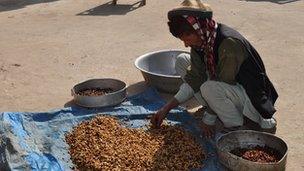Nepal farmers brew success with coffee cultivation
- Published
Increasing number of Nepalese farmers are taking up coffee cultivation amid rising prices
Coffee, for many of us, is a daily fix. But few would relate to it as being a life changer.
However, for Hom Raj Giri, a farmer in Nepal, that is exactly what coffee has been.
For decades, Mr Giri, like many other Nepalese farmers, was struggling to make money out of his farm. That was until he was introduced to the world of coffee farming.
"I earn three times more income from coffee than by cultivating millet and maize," Mr Giri tells the BBC at his farm located in the picturesque Khavre district in central Nepal.
He talks enthusiastically about coffee as he shows me around his farm where other members of his family are busy washing and drying the harvested coffee beans.
"It doesn't require any fertiliser. The wholesalers come to our home to buy coffee beans, which means you don't need to take it to market by yourself," he adds.
Growing popularity
Traditionally, farmers in Mr Giri's district cultivated maize and millet. But the proceeds from those crops were not enough to meet the rising living costs.
In an attempt to help the farmers boost their earnings, the government, along with various agencies, urged them to take up coffee farming.
While the farmers were initially sceptical about the commodity, higher returns have seen their mindset change over the years.
According to official figures, Nepal now has 1,700 hectares of coffee plantation, more than 10 times the area 20 years ago, when coffee cultivation started picking up.
Coffee is now being cultivated in 25 districts in the country and last year, Nepal exported about 400 tonnes of coffee beans - 30 times what was produced two decades ago.
That is 86 million Nepal rupees ($1m; £650,000) worth of shipments.
Further growth?
While that number pales in comparison to coffee exports from other Asian nations such as Vietnam and India, many here believe that the potential for growth of Nepal's exports is enormous.
"Nepalese coffee is different from other countries. We only produce Arabica type of coffee which is organic," says Raman Prasad Pathak, executive director of National Tea and Coffee Development Board.
Mr Pathak adds that Nepal's mountainous terrain also makes it an ideal place to cultivate coffee.
"Large tracts of hilly regions of Nepal, which are 800m to 1,600m, above the sea level are empty. This is ideal for coffee cultivation," he says. "Farmers can get additional income from these empty lands."

Coffee cultivation has become popular among Nepalese farmers over the years
According to Fairtrade, an estimated 1.6 billion cups of coffee are drunk worldwide every day and global coffee consumption has almost doubled in the past 40 years.
At the moment, Nepal exports coffee mostly to countries such as South Korea, Japan, Britain and the US.
The hope is that as Nepalese-grown coffee becomes popular in other countries, demand will rise further and boost earnings of the sector which now employs more than 26,000 people.
However, some argue that Nepal should not try and become a mass producer of coffee, but instead concentrate on creating a niche market.
"As far as mass production is concerned we don't have a single farm that's producing quantities that are sufficient for a large chain overseas," says Anand Gurung, who owns Himalayan Java cafe in Kathmandu.
"But what we can do is form a niche for ourselves, especially when everyone is going into an organic-producing crop."
Mr Gurung says that by creating a unique product Nepalese farmers will also be able to command a higher price for their crop.
Domestic boost
Nepal's coffee farmers have also got a boost from growing demand for the commodity at home.
Hundreds of coffee cafes have sprung up in the capital Kathmandu and other big cities frequented by tourists.

A rise in coffee cafes in Nepal has resulted in an increased demand for the commodity
"This has been a tea-growing nation, but now we are selling lattes and cappuccinos, which are very synonymous with tea," says Mr Gurung.
"We started as a single independent store and now we have nine different outlets. Opening those outlets has created a demand for more coffee shops," he says.
Mr Gurung, like many other cafe owners, buys coffee beans grown only in Nepal.
And with demand for coffee rising at home and in neighbouring China and India, Nepalese coffee farmers hope to brew up strong profits well into the future.
- Published7 February 2013
- Published6 February 2012
- Published1 December 2011